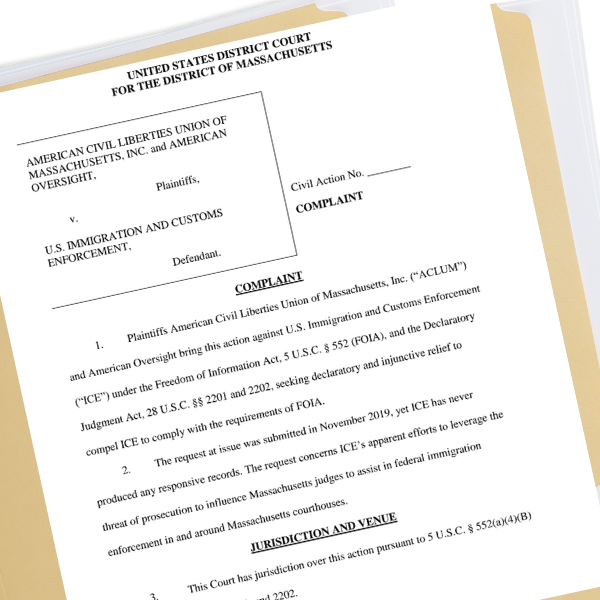
ICE Admits to Practice of Deleting Senior Officials’ Text Messages During Trump Administration
ICE has said that it instructed Trump administration personnel to wipe their agency-issued cell phones when leaving their posts — a practice that persisted even after it received public records requests for senior officials’ texts regarding an ongoing federal criminal investigation.

Immigrations and Customs Enforcement (ICE) has said that it instructed Trump administration personnel to wipe their agency-issued cell phones when leaving their posts — a practice that persisted even after the agency received public records requests for senior ICE officials’ text messages regarding an ongoing federal criminal investigation.
The agency made these admissions in new filings in the lawsuit brought by American Oversight and the American Civil Liberties Union (ACLU) of Massachusetts for the release of records concerning the criminal prosecution of a Massachusetts state court judge who allegedly allowed a defendant to avoid ICE detention in 2018.
In the supplemental declarations filed on Thursday, ICE asserted that it instructed employees to wipe their agency-issued phones upon departure, and suggested that the agency had no policy of preserving data on those cell phones.
According to the declarations, ICE employees were left to their own discretion as to whether communications sent using their mobile devices needed to be memorialized, and even then, employees were not required to preserve the original messages themselves. Moreover, agency personnel were instructed to erase phone data upon their departure from the agency. A “quick reference guide” from November 2017 included in the filings instructs employees on how to erase their devices before returning them to the agency.
The filings also suggest that the phones of several top officials were wiped after American Oversight and ACLU of Massachusetts had requested records of communications about the criminal investigation and prosecution of Judge Shelley M. Richmond Joseph.
In November 2019, American Oversight and ACLU of Massachusetts filed a Freedom of Information Act request for the release of records, including the emails and text messages of seven senior officials, regarding ICE’s response to allegations that Joseph had in April 2018 allowed a defendant to avoid ICE detention by exiting through the rear door of her courtroom. The groups sued in May 2021 after the agency failed to release any responsive documents.
The FOIA request sought communications of seven high-level ICE officials, including three former acting directors — Thomas Homan, Matthew Albence, and Ronald Vitiello — as well as former legal adviser Tracy Short and former Chief of Staff Thomas Blank, regarding the incident. The FOIA request followed a New York Times report in which Homan said that he was informed about the incident in Joseph’s courtroom the day it happened and “immediately” asked ICE legal staff if he could take legal action.
ICE’s declarations assert that Homan’s phone was deactivated in 2019, and that those of Albence, Vitiello, Short, and Blank were deactivated in 2020 and 2021 — suggesting they were wiped after the FOIA request was submitted.
Through American Oversight and ACLU of Massachusetts’ litigation, ICE has produced some documents but has not released any records related to Homan’s actions immediately after hearing about the incident. Documents produced in October 2021 include emails exchanged by ICE leadership from April 25, 2019 — the day of Joseph’s indictment — in which Tracy Short asked if Joseph’s arrest would be the “first of many” and wrote, “This is a great day.”
In an earlier court filing, ICE said that during the Trump administration, it had a “standard practice … to factory reset/securely wipe/destroy and delete all contents of mobile phone devices as they were being taken out of service.” The new filings are in response to a June order issued by the U.S. District Court of Massachusetts requiring ICE to provide more information about its apparent “practice” of instructing its employees, including senior officials, to destroy text messages sent or received on their government-issued devices.
Earlier this year, the Department of Defense and the Army admitted in court filings that the phones of certain top Trump administration officials had been wiped, and that any text messages from the Jan. 6, 2021, attack on the U.S. Capitol had not been preserved. This month, after American Oversight asked Attorney General Merrick Garland to open an investigation into the Defense Department’s failure to preserve the communications, the department announced a new policy regarding the preservation of text messages and other information stored on mobile devices. The Department of Homeland Security also recently announced a similar policy change following revelations that Secret Service texts from Jan. 6 had been lost and that the phones of top DHS officials had also been wiped.